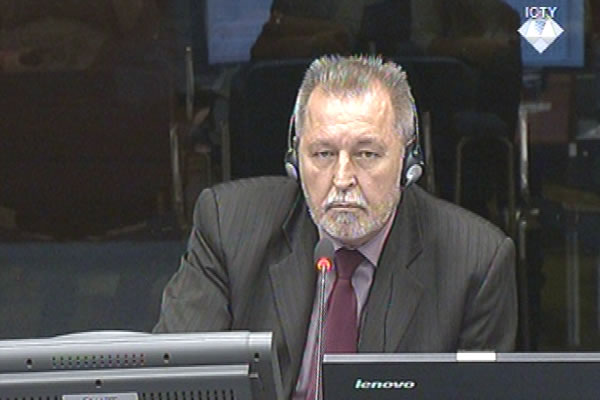Home
ARKAN AND ‘ARKAN’S MEN’ ARE RESPONSIBLE
Dusko Corokalo, security officer in the Sana Brigade, says in his statement to Mladic’s defense that Arkan and his men arrived in Sanski Most in September 1995. According to the witness, Arkan and his men were responsible ‘for all the bad things’ that happened to the non-Serb civilians. The prosecutor noted that Muslims and Croats had been killed and detained before the arrival of ‘Arkan’s men’. By 1995, most of the Muslims and Croats had already fled the town, the prosecutor stressed
 Dusko Corokalo, defence witness at Rako Mladic trial
Dusko Corokalo, defence witness at Rako Mladic trial Dusko Corokalo, former security officer in the 6th Sana Brigade, gave evidence in Ratko Mladic’s defense today. According to Corokalo, the conflict in Sanski Most broke out because Muslims violated the agreement on the carve-up of the municipality. The Muslims attacked and captured the town. The Serbs then launched a counter-attack, recaptured Sanski Most without any casualties and took over power. The witness wasn’t personally involved in the fighting, but was in town when the Serb army attacked the villages of Hrustovo and Vrhpolje. As alleged in the indictment, the Serb troops committed crimes against the local civilians in those attacks.
In the summer of 1992, Corokalo was sent to the frontline and he returned to Sanski Most in September 1995. There he saw Zeljko Raznatovic Arkan and members of his Serb Volunteer Guard. At that time, over 1,000Muslims and Croats still lived in several villages in the municipality, the witness explained. In his statement Corokalo said that ‘Arkan and his men did all the bad things to those people’. The witness thus exonerated the Bosnian Serb army, which was under the command of the accused.
In the cross-examination, prosecutor Jeremy noted that numerous crimes against non-Serbs in Sanski Most occurredlong before the arrival of ‘Arkan’s men’. For example, in the attack on the village of Hrustovo on 31 May 1992, Serb soldiers killed 27 women, children and elderly people. Corokalo claimed that he didn’t know anything about the crime despite the fact that he was the brigade security officer. Hrustovo and Vrhpolje were located in a ‘vast region’and it was not easy to get information, the witness explained.
However, the witness did admit that a few days later he heard about the crime committed on 31 May 1992 at a bridge near Vrhpolje. Captured Muslim villagers were brought there and forced to jump into the river, where many were shot to death. The witness was informed about the crime, but, as he explained,‘I didn’t dig any deeper into that’and he didn’t obtain any detailed information. In the re-examination, defense counsel Ivetic read out an excerpt from the evidence of a survivor of the incident. A man dressed in black with dark glasses and hair tied in a ponytail headed the group that committed the crime. The witness replied that there were no ‘such dandies’in his brigade.
The witness agreed with the prosecutor's suggestion that non-Serb civilians in Sanski Most were detained in the Betonirka hall, the sports hall and in the Krings Factory. From there, the prosecutor put it to Corokalo, they were taken to the Manjaca military prison camp. The witness agreed. Until the arrival of‘Arkan’s men’in Sanski Most, ‘tens of thousands’of Muslims and Croats had left the town, the prosecutor went on to note. Corokaloagreed with the claim.
Mladic’s memo of 23 September 1995 was the next document showed in the hearing. The document was sent to several recipients, including the Bosnian Serb president and MUP. The memo notes that Arkan and his men killed and arrested Muslims, and even abused Serb officers and soldiers. Therefore, Mladic urged President Karadzic to ‘rescind Arkan's authorization’. According to the prosecutor, Mladic’s wartime diary shows how the events enfolded. Mladic wrote that he spoke with chief of the VJ General Staff Momcilo Perisic and chief of the Serb Secret Security Service Jovica Stanisic about the presence of ‘Arkan’s men’. As shown by a police document, Arkan and his men were not arrested or expelled from Republika Srpska. On the contrary, they were moved to Prijedor to ‘arrest Serb deserters’. According to the witness, such decisions were issued at the highest level. He didn’t know anything about that, Corokalo emphasized.
As today’s hearing drew to a close, Rajko Sarenac, a colonel in the Bosnian Serb Army, began his evidence.
Linked Reports
- Case : Mladic
- 2014-11-17 KARADZIC’S ‘BIOLOGICAL ANALOGIES’
- 2014-11-13 ‘IGNORANT TYPIST’ MADE A MISTAKE
- 2014-11-12 NO MUSLIMS IN ROGATICA BY THE END OF WAR
- 2014-11-19 MAKING MUSLIMS FEEL LIKE THEY LIVED ‘IN A GHETTO’
- 2014-11-19 ‘SELF-ORGANIZED’ SERB GUARDS IN ROGATICA
- 2014-11-20 MLADIC’S WITNESS: MASSACRE IN VELAGICI ‘REVENGE FOR WORLD WAR II’
